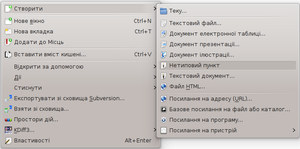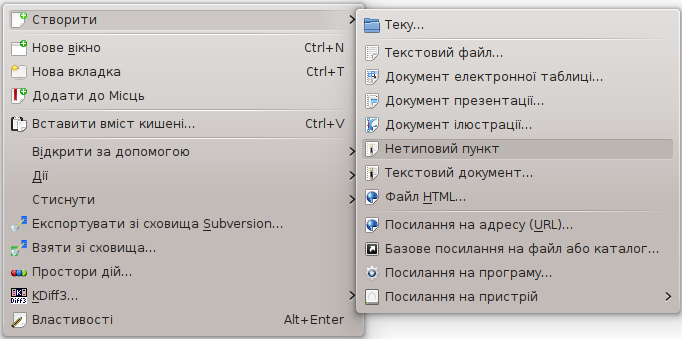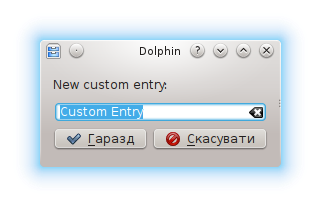Adding an entry to the Create New menu/uk: Difference between revisions
(Created page with "* '''Comment''' — мітка для назви нових файлів цього типу. Коли ви вибиратимете нетиповий пункт у меню ...") |
(Created page with "* '''URL''' — шлях до файла, що містить початкові дані, які записуватимуться до нових файлів відпові...") |
||
| Line 34: | Line 34: | ||
*: "New custom entry:" — значення поля '''Comment'''. | *: "New custom entry:" — значення поля '''Comment'''. | ||
* '''URL''' | * '''URL''' — шлях до файла, що містить початкові дані, які записуватимуться до нових файлів відповідного типу. Файли з такими даним зазвичай зберігаються у прихованій підтеці {{Path|.source}} теки {{Path|templates}}. Отже, скористайтеся відносним шляхом, який починатиметься з {{Path|.source/}}, наприклад {{Path|.source/custom-entry.txt}}. | ||
* '''Icon''' is the code of the icon that appears in the '''Create New''' menu for your custom entry. The code is the filename of the icon to use. You can browse MIME type icon files at {{Path|/usr/share/icons/<theme>/<size>/mimetypes/}}. For example, to use {{Path|/usr/share/icons/<theme>/<size>/mimetypes/application-vnd.oasis.opendocument.text.png}}, fill '''Icon''' with "application-vnd.oasis.opendocument.text". | * '''Icon''' is the code of the icon that appears in the '''Create New''' menu for your custom entry. The code is the filename of the icon to use. You can browse MIME type icon files at {{Path|/usr/share/icons/<theme>/<size>/mimetypes/}}. For example, to use {{Path|/usr/share/icons/<theme>/<size>/mimetypes/application-vnd.oasis.opendocument.text.png}}, fill '''Icon''' with "application-vnd.oasis.opendocument.text". | ||
Revision as of 07:22, 14 September 2014

|
У цьому підручнику описано процедуру додавання пункту до меню «Створити» програм для керування файлами, зокрема Dolphin та Konqueror. |
Пункти меню Створити називаються шаблонами. Ці шаблони визначаються або на загальносистемному рівні, у каталозі /usr/share/templates, або на рівні поточного користувача, у каталозі ~/.kde4/share/templates. У цьому підручнику ми опишемо процес додавання нового шаблону до каталогу ~/.kde4/share/templates.
Визначення метаданих
Створіть теку templates у каталозі ~/.kde4/share, якщо такої теки ще не існує, і увійдіть до теки templates.
У цій теці створіть новий файл із суфіксом назви .desktop. Приклад: custom-file.desktop.
Відкрийте цей новий файл і вставте до нього такі рядки:
[Desktop Entry]
Name=
Comment=
Type=Link
URL=
Icon=
Заповніть поля таким чином:
- Comment — мітка для назви нових файлів цього типу. Коли ви вибиратимете нетиповий пункт у меню Створити, ви бачитимете діалогове вікно, у якому середовище проситиме вас вказати назву вашого нового файла. Вказаний вами текст буде написом, на місці якого ви введете цю нову назву.
- URL — шлях до файла, що містить початкові дані, які записуватимуться до нових файлів відповідного типу. Файли з такими даним зазвичай зберігаються у прихованій підтеці .source теки templates. Отже, скористайтеся відносним шляхом, який починатиметься з .source/, наприклад .source/custom-entry.txt.
- Icon is the code of the icon that appears in the Create New menu for your custom entry. The code is the filename of the icon to use. You can browse MIME type icon files at /usr/share/icons/<theme>/<size>/mimetypes/. For example, to use /usr/share/icons/<theme>/<size>/mimetypes/application-vnd.oasis.opendocument.text.png, fill Icon with "application-vnd.oasis.opendocument.text".
This is an example of a filled .desktop file:
[Desktop Entry]
Name=Custom Entry
Comment=New custom entry:
Type=Link
URL=.source/custom-entry.txt
Icon=application-vnd.oasis.opendocument.text
Переклад назви пункту та коментаря
The Name and Comment fields can be translated to any language. To provide a translation, include a new field in your .desktop file with the form "Field[language code]=Value" for each language that you want to support. For example:
[Desktop Entry]
Name=Custom Entry
Name[uk]=Нетиповий пункт
Визначення вмісту
Create a .source folder in ~/.kde4/share/templates if such a folder does not exist already, and enter the hidden .source folder.
Create a new file with the same filename that you defined in the URL field of the metadata of your new entry, and fill the file with the default content that you want for new files created with your new entry.


